Every single video game is a miracle. That’s not an exaggeration; games take an incredible amount of time, effort, and care that anything, from the smallest phone games to the cutting edge AAA, continues to amaze me. Infinite Guitars is clearly a work of passion. It’s got incredible style, genre-bending action, and a soundtrack that does not miss. However, it arrives on the scene fundamentally flawed and unfinished. While it has some amazing ideas and I enjoyed playing it, it still needs a lot more time in the oven.
Infinite Guitars follows JJ as they explore their planet’s floating islands to rescue their grandfather. Everyone in this world has a core from which their energy springs and determines what kind of weapon they can conjure (for most this is a guitar). However, JJ’s core is broken, meaning their energy is constantly leaking out. Luckily, after making a scrap bot friend they name Ruckus, who eats an Infinite Core, they can receive and distribute a virtually limitless amount of energy.
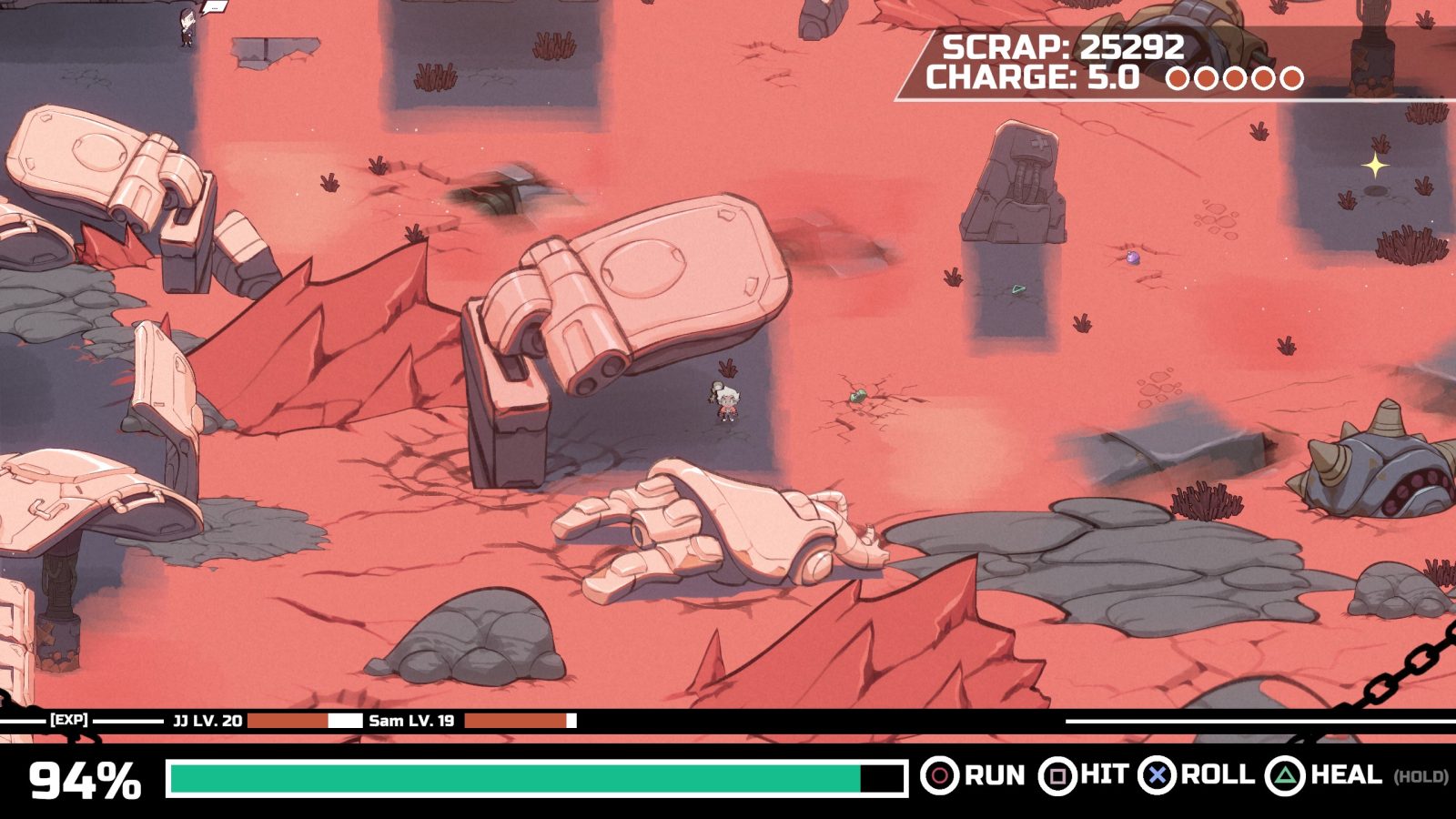
To be perfectly honest, that’s about as much of the story I was able to grasp outside of the overall gist of the themes and message, which I won’t spoil here. I enjoyed the story, but it’s written poorly and presented cheaply. With the former, it’s got the same problem as Chained Echoes: the moment to moment language definitely feels like whoever wrote the English script wasn’t terribly fluent. Because of this, I was never really clear on the whys and hows of everything, which isn’t ideal in an RPG, a genre typically focused on story. Again, the bones are decent, they just need some different meat on them.
As for the presentation, I always try to cut indie games a lot more slack than anything big budget, but the priorities here are super weird. Most scenes are presented in a visual novel style, with two character portraits at a time going back and forth with dialogue or narration. A few important scenes also have more complex illustrations or even full blown animation to go with them. There’s a great moment near the end where you see your full party just hanging out before the final battle, and it’s got some amazing characterization in how everyone is posed while they talk. However, there are still some important scenes that don’t get this kind of treatment. There are character deaths that only get a few lines of dialogue despite connecting to a member of the party’s motivations. Of course you can’t animate every scene, but the priorities here are a bit off kilter.
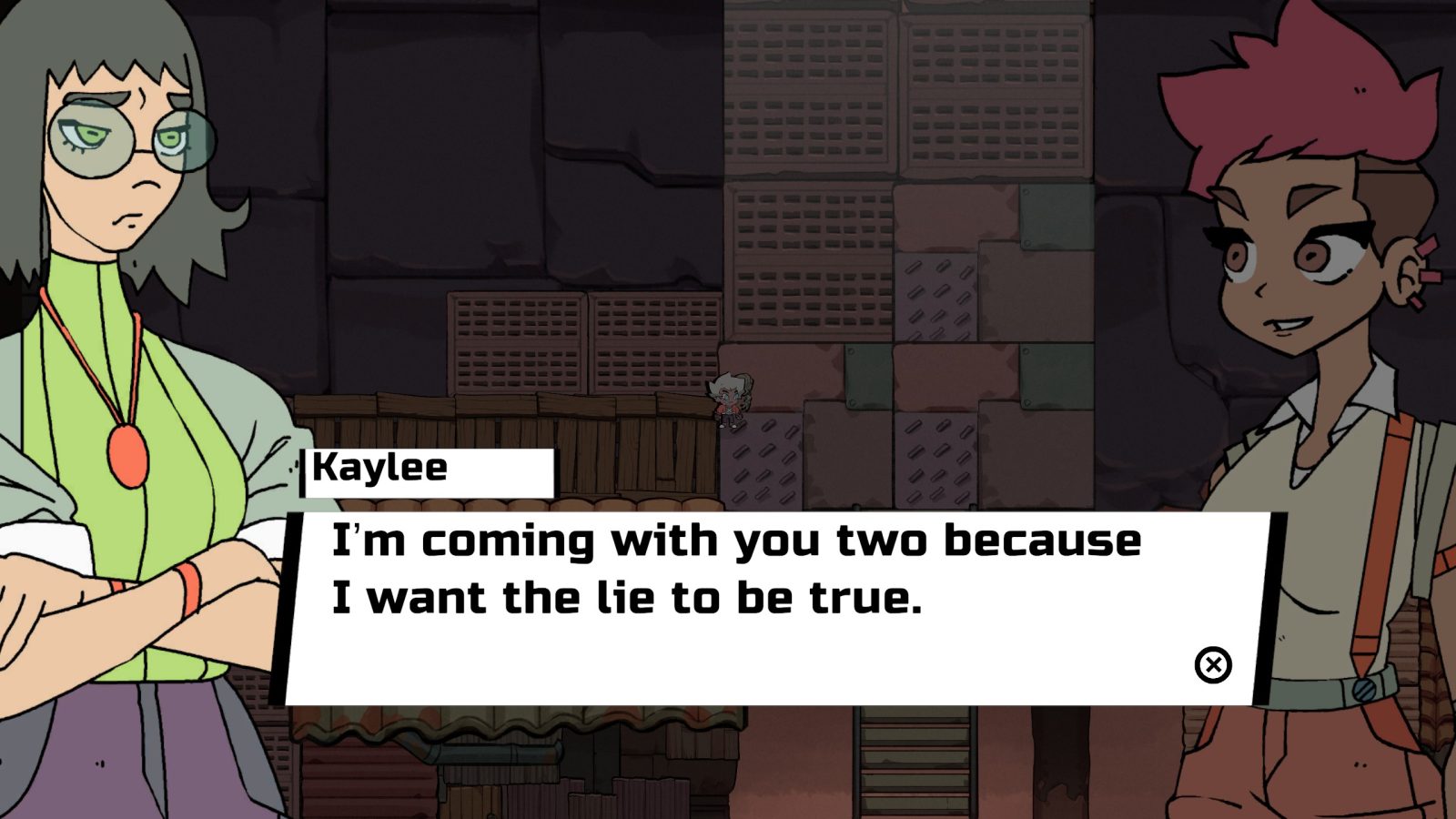
Despite those missteps, the game looks amazing. The rough, illustrated art style is unique and gives the feeling of an indie band putting their all into a single music video. Anything that’s fully animated is always a treat, attacks in battle especially look spectacular, even if I got a bit tired of watching them over and over (there is thankfully a skip button). The game is clearly inspired by some 90’s anime, in particular my personal favorite of all time FLCL, and wearing its influences on its sleeves is very much a benefit. While sprites, cutscenes, and in battle visuals are all anime inspired, the overworld uses a cutesy chibi style with thick outlines, making everything look like stickers on the backgrounds. Unfortunately, the overworld uses some confusing visual design and layering glitches that can make it very difficult to see where you’re able to go. Still, you’ve got a scrapy bunch of young people fighting mechs with musical instruments, what’s not to love?
On the overworld, you’ll explore, solve simple puzzles, dodge hazards, get the first strike on enemies, and even fight bosses. Part of Infinite Guitars’ appeal is the combination of tons of genres including RPGs, rhythm, and action but the latter is where the game feels stretched thin. While exploring, you move JJ around with the D-pad or left stick, run with Circle, dodge/interact with X, attack with Square, and heal by holding Triangle (more on that later). There are several rooms in the game where mechs will send out projectiles you need to avoid, which are supposed to be synced to the music, but they don’t deal much damage and often go out of sync so it’s faster and easier to just ignore them mostly. You supposedly take more damage when running, but I never noticed a difference with that either.
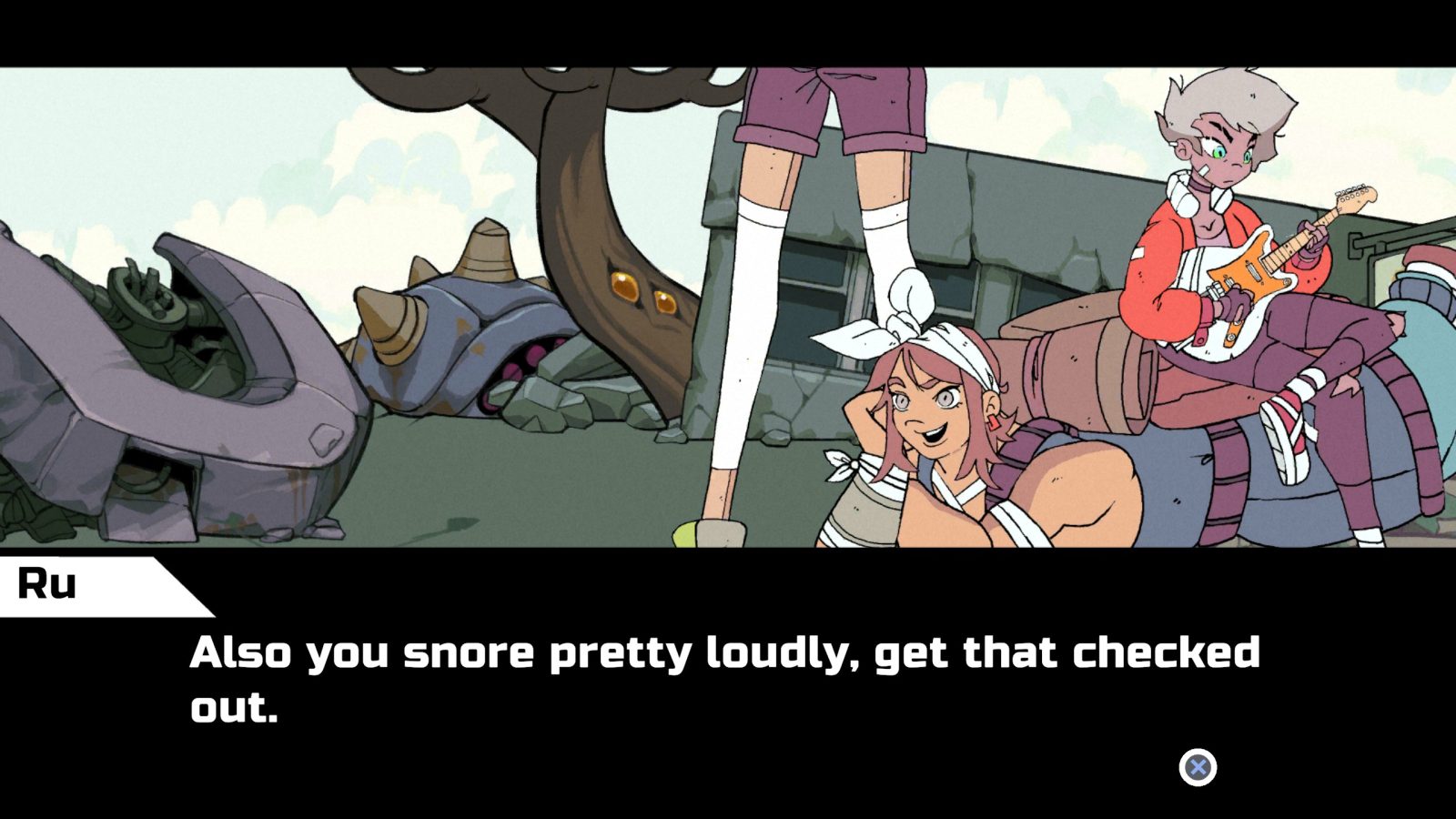
When encountering an enemy, you can hit them first to start the battle with your party’s turn. Your attacks do have a bit of timing to them here, as in you need to hold the button for a bit to do a perfect guitar hit. These have no musical cue, but the timing is easy to get down. Only perfect guitar hits will break obstructions on the overworld and there are achievements for beating every boss’ first phase with only perfect hits. While those bosses do have more complex patterns, it’s best to stick with the strategy of tanking all damage to start the actual, turn-based fight as fast as possible.
Once you’re in battle, you can choose a single character to act each turn. Each of your four party members has an associated element (red, green, or blue) with the exception of JJ and their moves provide specific benefits. While JJ is the all-rounder with attacks of every element, Sam uses red attacks that buff the party, Kaylee can debuff the enemy with green moves, while Ru prefers to hit very hard with blue attacks. Everyone also has a non-elemental guitar hit that costs scrap (currency found on the overworld) but builds charge. Charge has two uses: boosting the power of moves by spending up to three or healing. In battle, pressing Triangle when selecting a character will have them consume a charge to fully heal themselves, while outside of battle you’ll get a less powerful but party wide heal. This starts out as a very interesting dynamic between finishing battles quickly or keeping your party alive (later on, characters dying will boost the stats of everyone left alive), but since you gain a charge slot for every boss you defeat I almost always had too much of the stuff. By the end of the game, the meter literally doesn’t fit on screen anymore. While it serves an interesting story beat, the mechanic could really have used a bit more balancing as most battles in the game, including bosses, boil down to fully boosting one of Ru’s attacks and instantly winning.
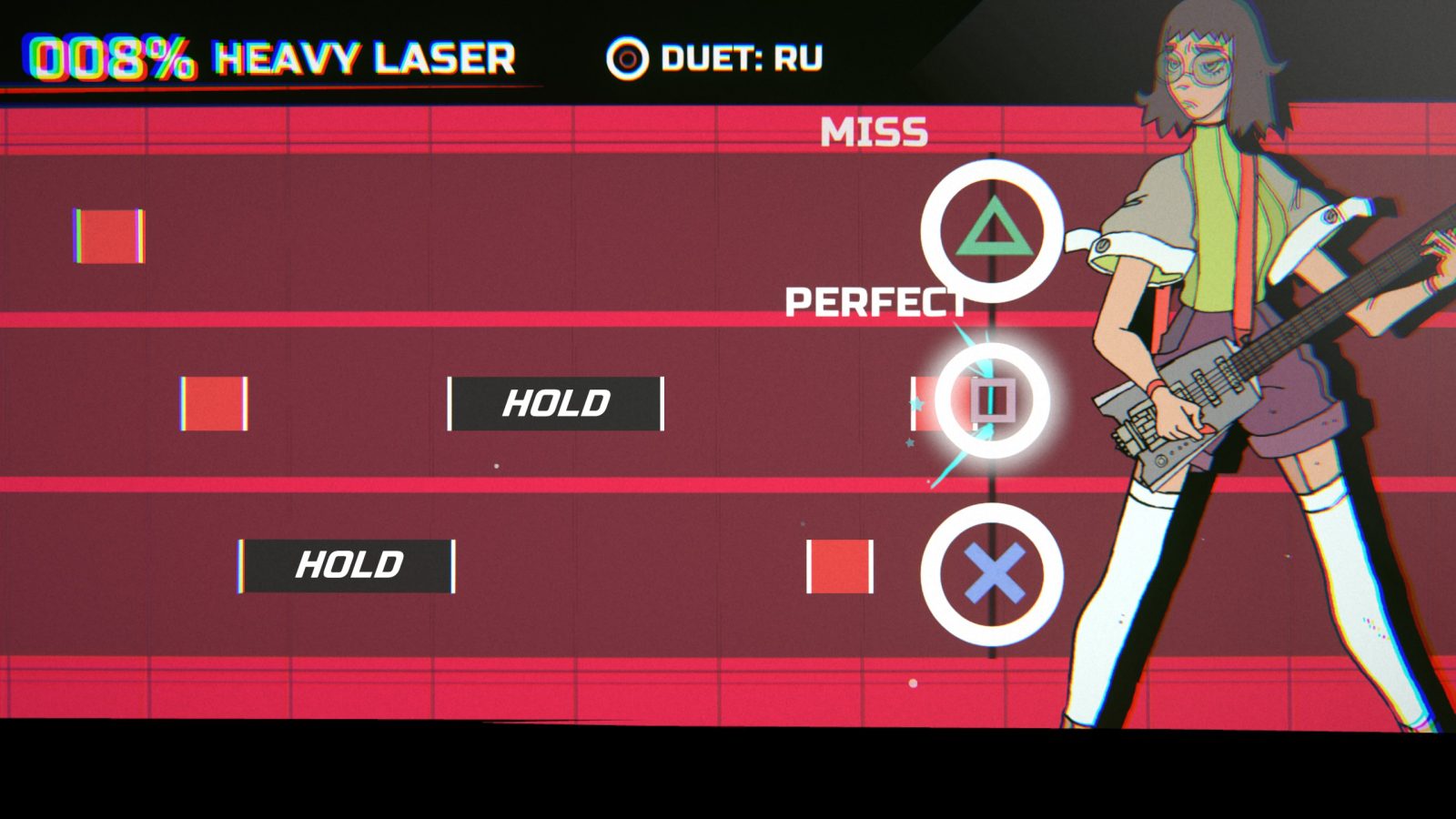
There is a caveat to that: the rhythm game that accompanies every attack. Just like Guitar Hero, notes will move from left to right and require you to press, hold, or mash the corresponding button to the music. The game has a ton of songs and all of them are fantastic, with the guitar solo you play changing depending on where you are in the song. How well you do in this minigame will determine how powerful the attack is. For example, when choosing the move you may see it will kill the enemy, but screw up royally on the minigame and you’ll only deal 25% of that total damage. To hit even harder or make up for your mistakes, you can utilize the Solo and Duet mechanics. Pressing Circle at any time during the minigame will tap in a party member or guest character to extend the minigame. While each successive Duet has diminishing returns, you can just go all in on a single attack to deal over 150% damage in a single hit if you’re good enough. It’s this that makes me think of Infinite Guitars as less of an RPG and more of a rhythm game.
Unfortunately, this has its major flaws as well. Hold and mash prompts have a habit of just not registering inputs properly, mashes especially. You could be holding the button down with perfect timing, but the game will just decide suddenly that you’re not and dock your percentage. The minigames can get very complicated and require a deft thumb, so it’s a shame it can be so unreliable.
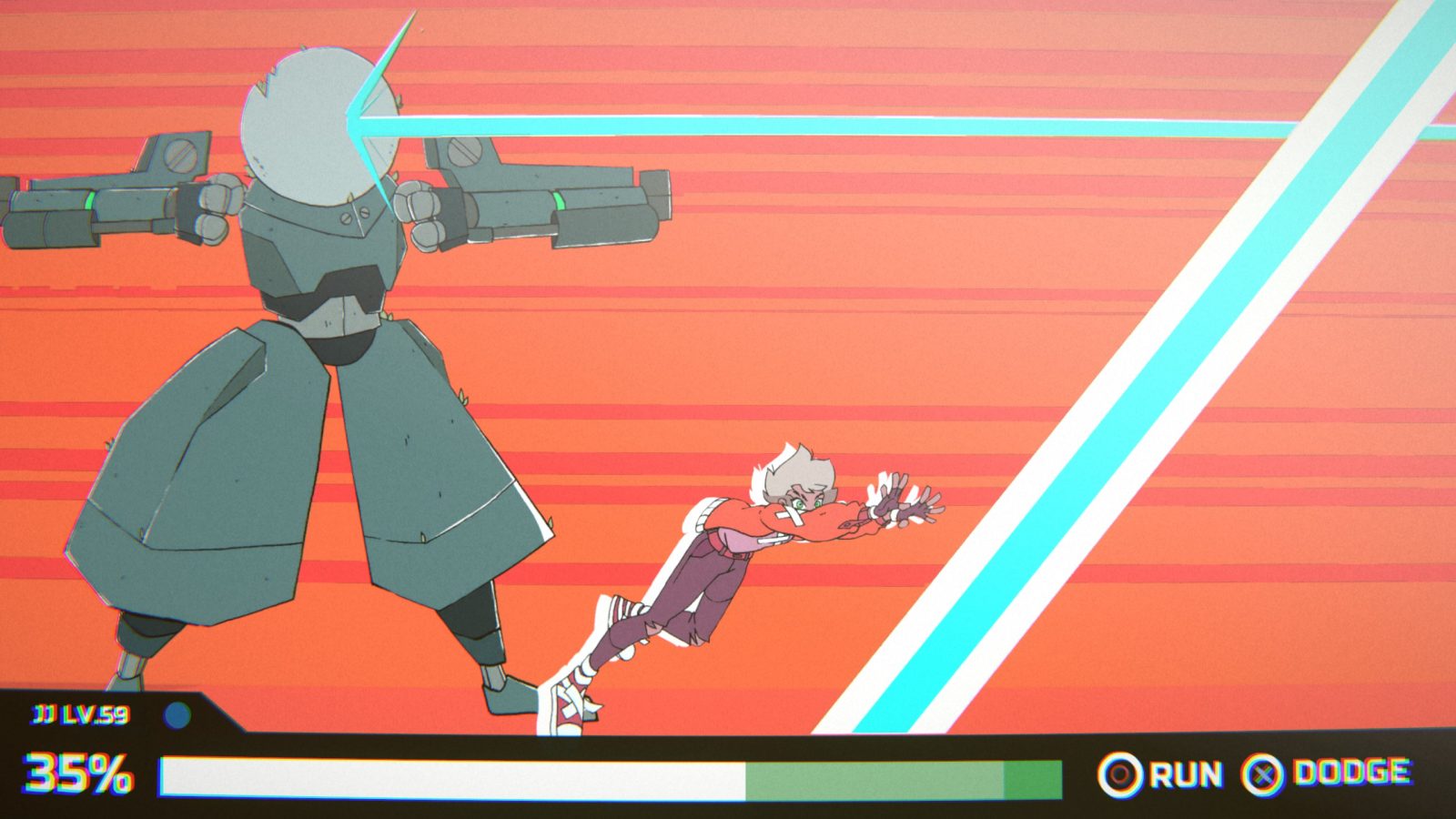
Coming back around to the action elements, when the enemy takes their turn they select a party member to attack and you’ll have to avoid their hits in real time by moving left or right, running, and pressing X to dodge. These attacks aren’t synced to the music either, but if you dodge late enough you’ll gain half of a charge. It seems impossible to avoid all damage in these bits, but they’re fun enough and break up the action.
What I’ve described so far sounds like a solid if flawed experience, but then we come to the glitches. I really want to love this game but there are bugs that will constantly derail everything, impede progress, and even softlocks requiring you to force close the game. The development team has been hard at work making sure people can finish the game, patching in temporary bypasses to basically every puzzle and unlocking chapter select before finishing the game, but it’s not enough. Their effort is commendable and shows they really care about their work. I reported a few of these bugs myself and their response was very quick and understanding, but it’s clear the game just needed a lot more time and polish. I often say that games are only held together by duct tape and hope, but that’s doubly true here. Almost nothing works; you might solve a puzzle only for the path to open up after leaving and reentering the room, key interactables won’t let you interact with them, lines of dialogue are attributed to the wrong character, an enemy’s displayed element is often incorrect, and some optional dialogue will lock you in place forever. I’d be more than willing to revisit the game in a year or so or if a Director’s Cut or equivalent patch comes around, but as it is, despite all the positives the game has to offer, it’s difficult to enjoy.
To end this on a positive note, I can’t overstate just how good the soundtrack is. Every single song on the ost is incredible and unique, featuring amazing guest artists like 2Mello, Carlos Eiene, Shady Cicada, Louie Zong, and more. Not only do I need this on vinyl, I need this soundtrack on CD, cassette, Hit Clips, and every old format of music because it feels appropriate. If I had to pick a favorite track (aside from the level up theme), it would definitely be Rebel, which serves as the boss theme. It really encapsulates the scrappy nature of the protagonists and the game itself and, despite everything, I’m rooting for it.





















